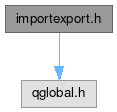Perceptual Color
#include <qglobal.h>
Go to the source code of this file.
Macros | |
| #define | PERCEPTUALCOLOR_IMPORTEXPORT Q_DECL_IMPORT |
Detailed Description
This file provides support for C++ symbol import and export.
Definition in file importexport.h.
Macro Definition Documentation
◆ PERCEPTUALCOLOR_IMPORTEXPORT
| #define PERCEPTUALCOLOR_IMPORTEXPORT Q_DECL_IMPORT |
A macro that either exports dynamic library symbols or imports dynamic library symbols or does nothing.
This approach is proposed in Qt’s documentation (chapter “Creating Shared Libraries”) – see there for more details. In short:
Build an application using the dynamic library
When your application is build using the dynamic library and includes the header files of the library, the macro imports the corresponding symbols of the library for you by expanding to Qt’s Q_DECL_IMPORT macro. This is the default behaviour of this macro.
Build the dynamic library
When the dynamic library itself is build, the macro exports the corresponding symbol by expanding to Qt’s Q_DECL_EXPORT macro. Exported symbols will be visible symbols in the dynamic library. To get this behaviour, it is necessary to define PERCEPTUALCOLORLIB_BUILD_DYNAMIC_LIBRARY always when this library itself is build.
Build either the static library itself or an application using it
When either
- building the static library itself
or
- your application is build using the static library and includes the header files of the library,
the macro expands to nothing, because for static libraries no import nor export must happen. To get this behaviour, it is necessary to define PERCEPTUALCOLORLIB_STATIC.
CMake code
The definition can be made within CMake:
PERCEPTUALCOLORLIB_BUILD_DYNAMIC_LIBRARY is defined PRIVATE, so it only becomes available when building the library itself dynamically, and not when building an application using the dynamic library.
PERCEPTUALCOLORLIB_STATIC however is defined PUBLIC, so it only becomes available both, when building the library itself statically, and also when building an application using the static library.
And you also have to make sure that all symbols that are not explicitly exported will be actually hidden on all platforms:
For your information: The opposite would look like this:
Further reading
- Note
- CMake also offers support for symbol import and export. It can generate a corresponding header by using the
generate_export_header()command. However, this is always an additional step and makes the build and install configuration more complex. Furthermore, we produce a second internal library target out of the same source code, which has a different symbol visibility for unit tests. As CMake-generated import-export headers use the name of the target as part of the macro names it defines, this would get complicated. Having our own macro is easier. -
CMake’s
generate_export_header()command also has portable support for deprecating symbols. However, since C++14 there is[[deprecated(string-literal)]]part of the standard. As we require even C++17 anyway, we can use this as a portable standard instead of CMake’s macros.
- See also
- https://doc.qt.io/qt-5/sharedlibrary.html#using-symbols-from-shared-libraries
- http://anadoxin.org/blog/control-over-symbol-exports-in-gcc.html
- https://labjack.com/news/simple-cpp-symbol-visibility-demo
Definition at line 154 of file importexport.h.
Documentation copyright © 1996-2025 The KDE developers.
Generated on Fri May 2 2025 12:04:47 by doxygen 1.13.2 written by Dimitri van Heesch, © 1997-2006
KDE's Doxygen guidelines are available online.